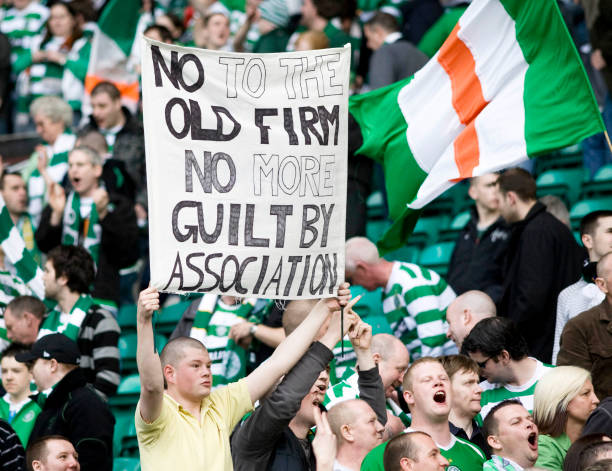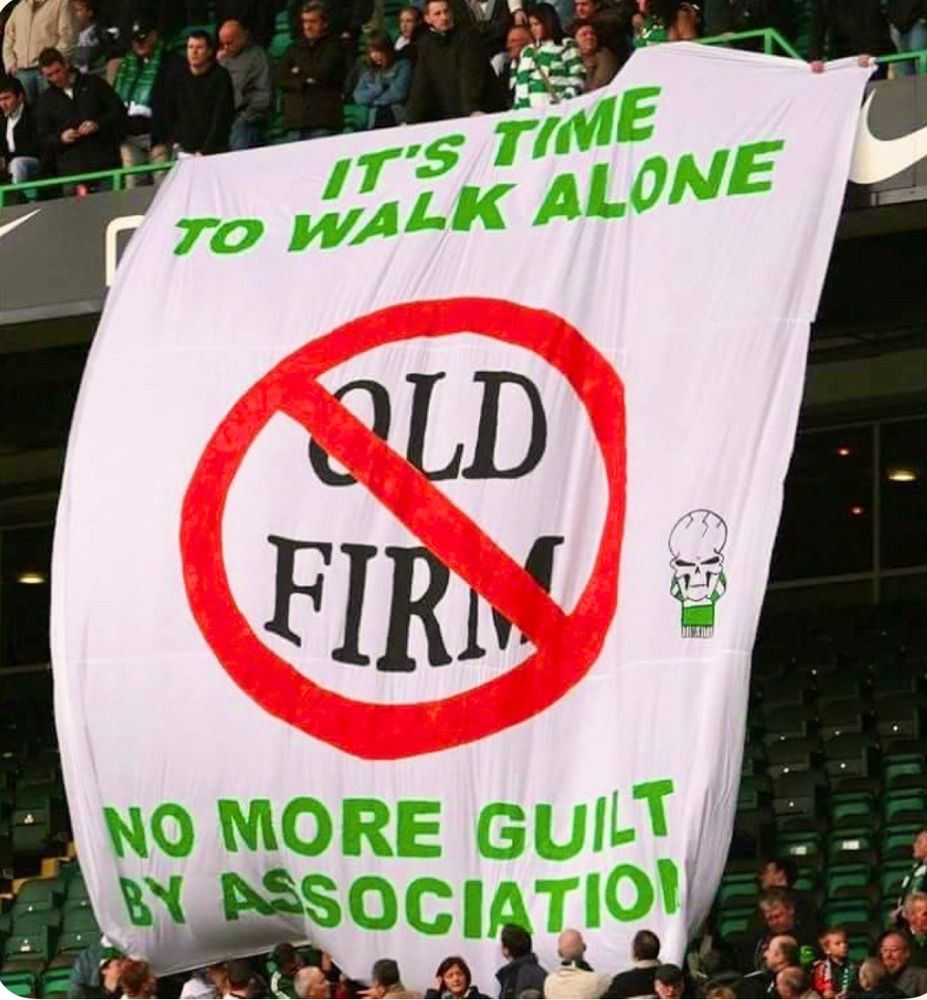Celtic Slang | About Celtic | Celtic’s Foundation
Details
Reference: Rivalry of Celtic & Rangers (OldCo)
Origins: 1904 Satirical cartoon
Description

Prior to the death and liquidation of Rangers in 2012, Celtic were unfortunately too often twinned with Rangers much to the annoyance of much of the support under the handle ‘Old Firm‘. That said, the derby matches were often the highlight of the season, and it was always fundamental to be ahead of Rangers. The rivalry was tense but captivating.
History
The tag originated from the early days when match-ups between the two became the biggest draw in the club game especially following the decline of Queen’s Park. With the overtures inherent in the match-up reflecting the chasm between the two in terms of ethos, loyalty, politics, religion, society and wealth, the matches between the two could be a powder keg.
The earliest reference to the tag is pointed to a satirical cartoon by The Scottish Referee magazine in 1904, depicting a dishevelled man carrying a message board with the tag ‘Patronise the Old Firm‘. This was actually a dig into what was the increasing hegemony of the game by the two Glasgow giants, yet in time the label won favour and became part of the footballing language. The label may actually have been in use beforehand but this is probably the first recorded evidence of its use.
The matches were money spinners for the owners of the clubs, the merchants on the pavements, the local publicans, the eateries along the road and even the policemen earning overtime payments. This meant that ‘Old Firm‘ tie ups were mouth watering affairs for a variety of people creating vested interests, and so the tag was a great bit of marketing for those with financial interests in the match.
In many ways the underlying cultural divide has given the city Derby a uniqueness absent in every other derby. The Manchester, Buenos Aires, Milan, London, Madrid, Rome derbies have their divisions but none have been as explicit and as deep as in Glasgow (usually their differences are fabricated or exaggerated to give some credence). This has been a two edged sword, yet built a fascinating aura round the games. Doesn’t matter where you go in the world, everyone who knows about football knew about the Celtic v Rangers match as can be seen in those ubiquitous ‘Top ten lists’ so favoured by unimaginative bloggers and lazy journalists.
The problem is that outsiders unaware of the true nature of the rivalry seemed to mistakenly treat both as two sides of the same coin, and then there were those who found that treating the two sides as such as convenient (e.g. shock jock media demagogues and soap box politicos).
In reaction to this, an increasing number of Celtic fans since the 2000s have been rejecting the usage of the term ‘Old Firm’ so to end any ‘guilt by association‘. The inception of this line of thought can be traced back to a joint anti sectarianism banner between Celtic fan group The Jungle Bhoys and a Rangers fan group. It created a backlash as the problem at Rangers was always far in excess of anything at Celtic (as well explored and explained by journalist Graham Speirs), and this was seen to unfairly muddy the Celtic support’s hard-earned reputation. Led to the birth of the Green Brigade too.
Modern Times
Due to the modernisation of stadia and other parallel measures, the atmosphere at matches in general is more sanitised than they once were. At Celtic v Rangers games this was to be partly true, younger fans can never truly understand the mass aggression and fury that could be an old Celtic v Rangers games in the older days on the old style terraces.
Once stadia became all seater, the atmosphere was still electric but measures meant that older more controversial songs and chants were being clamped down on, changing the atmosphere, whilst ticket prices have also had an impact on the composition of the fans present.
Spin offs
During the early eighties, the emergence of Aberdeen and Dundee Utd as powerhouses in Scotland saw the two sparring often for the silverware ahead of their Glasgow peers. So unimaginatively their head to head matches were dubbed as ‘The New Firm‘.
A homage to the Glasgow Derby, but an indication of the burgeoning new challenge in the game. Still used many years later but it has less stress put on it as they long declined in the nineties with the odd challenge.
In England, some fans have crudely tried to label their derbies as equivalent but they never are (notably Man Utd v Liverpool). The most humorous and tongue in cheek tribute has been the tagging of the East Anglia Derby between Ipswich and Norwich as the ‘Old Farm‘ Derby.
Death of Rangers
With the death of Rangers in 2012, the term should have been consigned to history. Yet due to the vested financial and political interests that resonate from the term, it was always going to be resurrected. So for the media and others the ‘Old Firm‘ tag has been stamped onto any match to be played between Celtic and TheRangers zombie tribute act (Sevco).
Only time will tell how the term will linger on, but for Celtic fans (even official usage) has been fully stopped, the preference now being just to use the term “The Glasgow Derby“.
In 2022, Sevco pulled out of a tournament in Sydney (Australia) which would have seen Celtic play Sevco for the first time anywhere outside of Scotland. Quite controversial, but thankfully Sevco pulling out ended the tie-up. One of their key stated reasons? They claimed the organisers were NOT using the Old Firm branding at all as they were requested to do so by Sevco. Celtic hold the joint copyright and likely stopped it. Nobody believed Sevco’s reasons, and all just laughed. They then adorned the whole of Ibrox with the tag ‘Old Firm‘ to try to drum in their misplaced point, but Celtic won 2-1 in a victory in that April 2022 league match that effectively set up Celtic for the vital league title, so it all backfired on them!
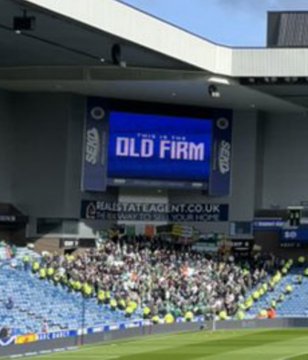
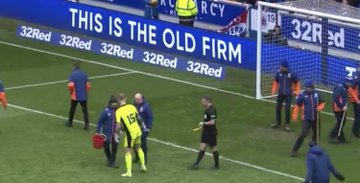

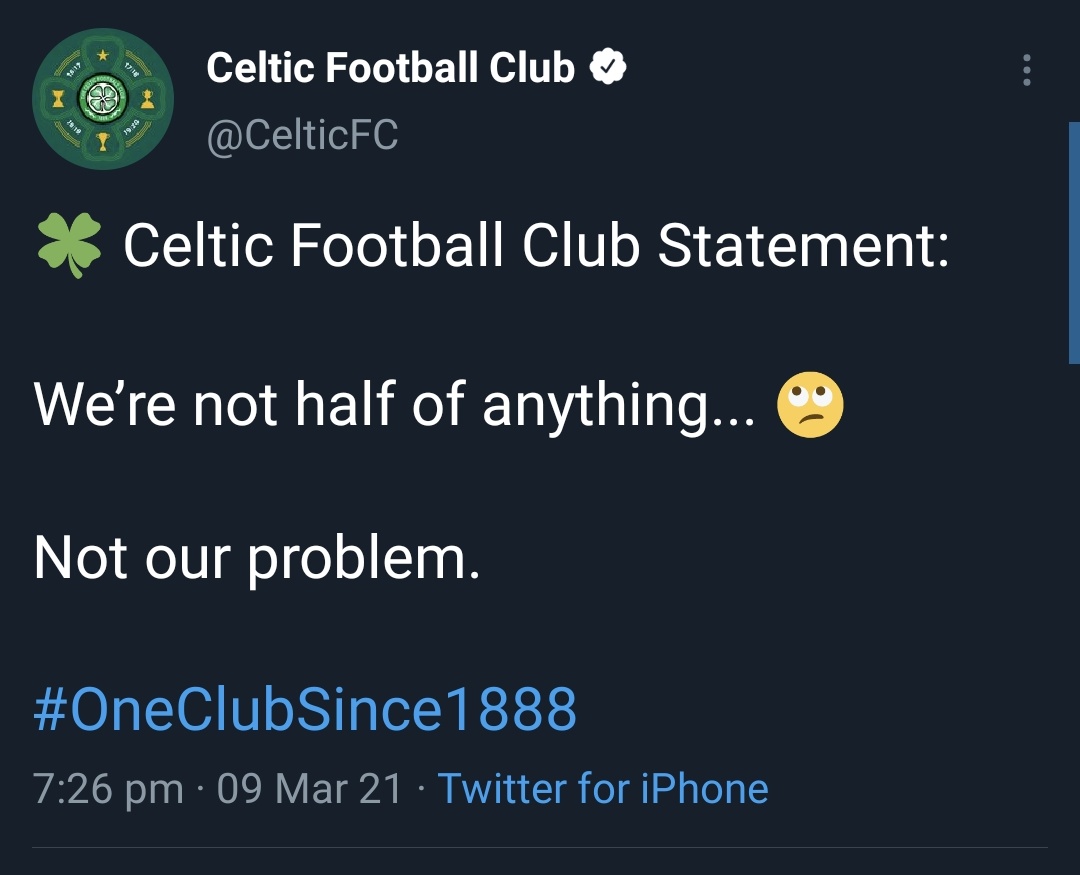
Links
Articles
Archie Macpherson on why Celtic and Rangers will still hate each other after Covid-19
Commentator doesn’t regret likening the 1980 Scottish Cup final riot to Passchendaele
By Aidan Smith
Saturday, 9th May 2020, 7:30 am
https://www.scotsman.com/sport/football/celtic/archie-macpherson-why-celtic-and-rangers-will-still-hate-each-other-after-covid-19-2847688
In his long lifetime, Archie Macpherson has uttered hundreds of thousands of words on the Old Firm. From precarious scaffolding-and-tarpaulin eyries during commentary. From the comfort of the TV studio, sometimes while suffering the very obvious discomfort of a producer bellowing into his ear via a Trimphone. And latterly as a kind of emeritus
professor of our great, glorious and girny game, adding heft and insight to those big debates whenever Celtic or Rangers or both are discussable, which is most of the time.
He’s now written tens of thousands more words for a book and as we’re chatting about it one in particular is exercising him, having just told me he “enjoyed” the riot at the 1980 Scottish Cup final.
You’ll remember the game – no, that was a shocker, but you’ll have burned in your memory the immediate aftermath, the rival tribes kung-fu fighting on the pitch and Macpherson trying to make sense of it all. “Let’s not kid ourselves,” he said, “these people hate each other.” He likened the bottle-flinging mayhem to Passchendaele and to Francis Ford Coppola’s odyssey of war madness, Apocalypse Now.
Celtic: Get the latest team news, match previews and reports
A Celtic fan charges on to the pitch as police officers try to restore order at Hampden
A Celtic fan charges on to the pitch as police officers try to restore order at Hampden
“Do I mean ‘enjoyed’?” he wonders today. “Maybe that’s too strong. But I got great satisfaction from it because of the challenge it presented for a broadcaster. You’re there to describe one kind of event and suddenly something entirely different happens.” In the book, in his lyrical way, he compares this to “a bassoonist turning up for an orchestral performance and suddenly being expected to play lead violin”.
He continues: “What do you say? How much do you say? I didn’t want to state the bloody obvious, which like nearly all commentators I’d done before, or just garble on and on.” Passchendaele doesn’t make the book, does he think in retrospect that was the wrong remark? “It’s not there? I wasn’t aware of that. No, I didn’t edit it out and I don’t regret saying it.”
It is good to be speaking to Archie. When the Saturday Interview began 14 years ago there was a desire that every week there should be someone new. Not a rule as such, this was perhaps too idealistic when the profile has been going this long. The pool of worthy subjects is not bottomless and some have had new stories to tell, meriting a second appearance. Thus a few notables have appeared on these pages twice but Macpherson is the first to achieve a hat-trick, which seems entirely fitting.
It is good to be speaking to him because, well, he’ll be 86 later this year and we must look after our fitba oracles, checking in with them every once in a while, and this is an opportune moment. “Yes, we’re surviving,” he says of he and his wife Jess, locked down in Bothwell, Lanarkshire. “I can get out for a good walk and if I go beyond the village I can’t help thinking about folk not far from here in places like Drumchapel and Easterhouse where for some poor souls the situation must be horrific.
Archie Macpherson’s new book, More Than a Game: Living With the Old Firm, is published by Luath Press. Picture: Craig Williamson/SNS
Archie Macpherson’s new book, More Than a Game: Living With the Old Firm, is published by Luath Press. Picture: Craig Williamson/SNS Copyright: SNS Group
“The trick for us is to try not to dwell too much on the things we’re missing. I play golf – badly – and am not sure when I’m next going to be able to get over to our wee place in Fife for another game. God knows when this will end for old yins like us. Maybe not until there’s a vaccine.”
Is he missing football? “Not particularly,” he says. After his last radio gig ended, he continued going to games but this stopped about a year ago. “I was able to walk into a stadium and sit in the pressbox but I started to sense these eyes on me: ‘What’s he doing here? A supernumerary. His days are up.’” Isn’t this sad? We can be pretty mean sometimes. And there’s further evidence of this towards the end of the book when Macpherson ponders the political dimension. During the build-up to Indyref in 2014, after being persuaded to speak for the “No” campaign, he made a trip back to his old Shettleston stamping-ground for newspaper photographs and, as he stood outside the house where he was born, a local grump shouted down from his window: “F*** off ya English c***.”
Not that he’s lacked a team to cheer in the past few weeks. Grandson Stuart was among the brainboxes from Darwin College, Cambridge who battled through to the semi-finals of University Challenge. “Stuart is studying physics and I must tell you that’s not hereditary. When I was at school I found arithmetic challenging enough.”
We’ll return to the Old Firm and 1980 shortly but of course there should have been another Celtic-Rangers insurgency happening round about now, almost certainly just as passionate and to some degree as poisonous as countless clashes before it. How does Macpherson think this Premiership season should be resolved and, speaking before the revelation last night that talks had collapsed, where does he stand on reconstruction?
“If at all possible, for the sake of sporting integrity, the season should be played to an end. Celtic would win the title, probably with a good deal to spare, but this needs to be seen to happen. Regarding the make-up of the top flight, nothing is perfect that’s for sure, but I’ve been punting the notion of a 16-team division for as long as I can remember. The argument against that has been there would be too many easy games. Well, maybe there wouldn’t be. Celtic have been steamrolling everyone but the clubs immediately below them have all struggled against teams in the bottom half.
“A 16-team Premiership would enable clubs to risk fielding younger players, spreading that gospel wider through Scottish football. Another argument against is that the broadcasters wouldn’t want any less than four Old Firm games but maybe end-of-season play-offs could still provide that.
“Whatever happens, reconstruction has to be considered very carefully. You’ll remember the first Premier League, an elitist division of only ten teams. Jim McLean told me that it wouldn’t be a competition of ten but eight as Celtic and Rangers were never going to be relegated. He warned that football would become negative – it did. That it would become defensive – it did. And he said that a wee guy like Graeme Payne would just be kicked off the park.”
Whither Hearts? Macpherson has perspective on the Jambos’ plight, too. “There are times when I think we have to apply commercial considerations. I consider myself an old-fashioned Socialist but I look at America, that citadel of capitalism where they try and equalise the power of teams in different sports, and I wonder if it’s sensible to be putting a club like Hearts with such a big support and a great stadium into a lower league – and especially when they’re not being given the chance to save themselves. Would that be doing us any good in the long run?”
Macpherson may no longer be bearing witness to Scottish football from the stands but all he’s seen over nearly 60 years is going into books. There’s been one about Jock Stein and remembering the Celtic godhead, who of course features in the new tome, More Than a Game: Living With the Old Firm, he today comes up with what he thinks might be the first time he heard the great man speak: “Not heard as such, but I could read his lips. He was in the dugout at Easter Road, just below where I was doing radio commentary. Our BBC driver who ferried us to and from games was a wee guy, dark hair, Italianate features, quite eccentric. With the match in progress I suddenly noticed him chatting to the Hibs goalie. He was actually leaning on a post. Jock spotted him too and I could clearly see him mouth the urgent inquiry: ‘Who the f*** is that?’”
Macpherson’s previous book gathered together all his World Cup assignments but this one was, in a way, unavoidable. For him, Celtic and Rangers were the elephants in the study. He had too many tales to tell of Glasgow’s eternal struggle, not least about the shocking events of 10 May, 1980. “Each anniversary of that final, ten, 20 and 30 years on, I would be rung up by journalists and asked about what happened. I eventually thought that maybe I should write about the game and its consequences.” Archie, then, would be Apocalypse Now’s Capt. Willard who ventured up river and into the heart of darkness in search of a madman.
His odyssey takes in the seismic moments before 1980 and since, including the day Rangers shocked the world – but some of their own supporters the most – by signing a Catholic. Macpherson had been tipped off about Mo Johnston first thing that day in ’89 by his son Douglas but scoffed: “There’s more chance of the Pope wearing the No 9 shirt at Ibrox.” A few hours later he was climbing the marble staircase, still not really believing it, when he was met by a photographer in a state of high anxiety who gasped: “Aye, he’s up there.”
As the voice of Sportscene during Old Firm explosions Macpherson would sometimes have to dodge shrapnel, of the metaphorical sort at least. Stein accused BBC Scotland of Rangers bias and Willie Waddell accused Queen Margaret Drive of Celtic bias and once – the 1973 Scottish Cup final – gestured angrily from the Hampden track for manager Jock Wallace to unclip his microphone and end his post-match interview.
After more tremors in ’87 when four Old Firm players – Frank McAvennie, Terry Butcher, Chris Woods and Graham Roberts – ended up in court Macpherson was named as a character witness though ultimately not called. He faced a “charge” of his own – that during commentary he referred to Rangers men by their Christian names more often than he did Celtic men. “This accusation didn’t come from a pub doormouth, though there were plenty of them, but Jimmy Farrell, a Celtic director, who was chairman of the Race Relations Board in Glasgow. You’d think he should have been concerning him with more vital matters.”
Then there was the Ibrox Disaster. George Davidson had been the man at the microphone that bitter afternoon in ’71, Macpherson being summoned to an urgent meeting in the early evening over how the tragedy would be covered when a BBC colleague would utter a remark of epic crassness. “Present were the Lord Provost of Glasgow, the Chief Constable and others. My sports editor, Peter Thomson, was engulfed in emotion so I pressed the case, no question about it, for the highlights of the game to be cancelled. This middle-class apparatchik thought that was excessive. ‘How many were at the match?’ he asked. Eighty thousand. “And how many died?’ Sixty-six. Then he said: ‘Sixty-six out of 80,000 – not all that many, is it?’ My response wasn’t exactly career-enhancing.”
Gross under-reaction and just-as-ludicrous over-reaction. “The world’s greatest derby” and “Scotland’s shame”. It’s just football. No, it’s all about sectarianism. Macpherson is our guide through what you might call this Pure Mad Moral Maze and as usual with him there are walk-on parts for a bewildering array of improbables including Joan of Arc, Jacques Cousteau, Henry V, Dick Emery, Lon Chaney Jr, Mary Beard, Perry Mason, Wyatt Earp, Bette Davis, Andy Warhol and Abba.
It’s interesting, I say, that three women are so prominent in More Than a Game and emerge as virtual heroines. There’s the clippie on the bus to Carntyne when young Archie, visiting his granny, witnesses his first fight involving grown men as they squabbled over an Old Firm match, calling each other Fenian and orange bastards until being chucked off.
There’s Elaine Mudie, the mounted policewoman who enraptured the tabloids by riding to the rescue with baton flailing, although she insists this was simply because she was “a blonde on a white horse”. And what’s more the most vivid image of order being restored when her horse suddenly bucked had been the result of the animal being struck on the backside with a toilet roll – “Hampden’s least lethal weapon,” says Macpherson.
And finally there’s Cara Henderson, the girlfriend of a murdered Celtic fan who founded the anti-sectarian campaign Nil by Mouth. After Henderson attended her first Old Firm match, Macpherson in a newspaper column called her naive, but as he writes in the book, he was soon upbraided for being a “purveyor of plodding orthodoxy”.
“I underwent a transition with Cara,” he says today. “Before, I thought you couldn’t really understand Scottish football culture unless you were steeped in it. Consequently, a little lassie from a college in Oxford coming on to the scene just seemed preposterous. But then I began to realise that being steeped in it can make you far too insular and myopic. All the observers of my generation thought we knew the answer to the problem of sectarianism in the game, which seemed to be: ‘Ah well, this will carry on in perpetuity.’ We’d become lazy. A person like Cara Henderson was representative of the necessity for a light to be shone on the issue, exposing it in a way that was quite novel.”
Macpherson has in the past quit Scotland – to be Paris-based for Eurosport – thinking he would be glad of a change of scene, only to quickly start to miss our football and one fixture in particular. “The game in France was of good quality but clinical and for me it lacked identity. There’s a compulsion about Celtic vs Rangers, a universality, and it’s gripping. If you support another Scottish club you may not like that but it’s a fact.”
The day of the 1980 final was also when the Rubik’s Cube was launched and Macpherson likens legislators’ efforts to solve the various problems arising from the internecine rivalry as trying to crack the puzzle while wearing boxing gloves.
Can they ever be solved? Could they, amid such idealistic talk of nothing being the same after Covid-19, be remedied soon? “It’s difficult to provide an answer. That millions might very well be dead by next year might suggest that a degree of humanity will affect us all to the extent that even football fans will lower their levels of hatred and become more peaceable but I’m not at all sure I can see that happening.
“Regarding the Old Firm, some things are better. Stadia are better and society in general isn’t so bothered anymore about what religion you are, which foot you kick with. But the current issue between the two clubs is all about getting to ten-in-a-row. Whatever happens, it will remain an issue, and an excuse to accentuate the hatred.”
Let’s face it, said Archie, one day in May 40 years ago, that’s how they regard each other.
More Than a Game: Living With the Old Firm is published by Luath Press.
